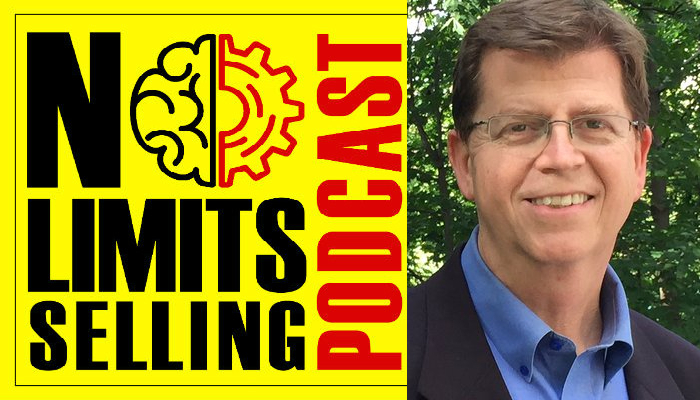Why Making A Habit Jumpstarts Your Life's Success
On Episode 156 of The No Limits Selling Podcast, we have Bruce Langford, Mindfulness Life Coach, Hypnotist, and Host of the Mindfulness Mode Podcast. Bruce Langford works full-time in the field of mindfulness as a consultant and life coach. He is the host and creator of the Mindfulness Mode Podcast where he interviews people from all walks of life who use mindfulness to stay centered and grounded.
At one time, Bruce lived with a high level of anxiety, but as he began to apply mindfulness strategies, his anxiety became minimal. Bruce’s extensive background for over a decade in bullying prevention equips him, through mindfulness, to inspire employees to replace self-bullying and judgmental behaviors, with a strong desire for cooperation and respect.
Bruce is now hired by companies to improve corporate culture by replacing stress and anxiety with team spirit and self-respect. As a result of his training, employee sick time declines, general wellness improves, and profits increase. Bruce has delivered more than 1,700 live presentations and his writings have appeared in numerous publications.

Contact Bruce:
[EDITOR’S NOTE: This podcast is sponsored by No Limits Selling. It is a fun, fast-paced podcast that delivers hard-fought business advice that you can implement today to improve your sales and performance]
Interested In Our Real Estate Coaching Services? Explore Our Website: Link
Feeling Not Well Today? You Can Use Our Mindset Boosters App To amp Up Your Mood: Link
Find us on Social Media:
LinkedIn | Facebook community | Instagram
Like what do you listen to? Subscribe to our podcast!
Ready to become fearless? We can help you become fearless in 60 days so you accomplish more in your career Schedule A 15 min Call with Umar
Summary
Introduction and Background
The podcast begins with an introduction of Bruce Langford, a mindfulness life coach and the host of the "Mindfulness Mode" podcast. Bruce shares his background, explaining how he transitioned from being a music teacher to a mindfulness coach. He was inspired to make this change after observing the transformative power of mindfulness in his students' lives.
The Power of Mindfulness
Bruce discusses the power of mindfulness, emphasizing its ability to bring about positive change in individuals. He explains that mindfulness is not just about meditation but involves being present and fully engaged at the moment. Bruce believes that mindfulness can help individuals overcome challenges, reduce stress, and improve their overall quality of life.
Mindfulness Techniques
Bruce shares some mindfulness techniques that he uses in his coaching. These include deep breathing, visualization, and grounding exercises. He also talks about the importance of regular practice in mastering these techniques and achieving mindfulness.
Mindfulness in Business
The podcast also explores the role of mindfulness in business. Bruce explains that mindfulness can help business leaders make better decisions, improve their focus, and enhance their relationships with employees. He shares examples of successful business leaders who practice mindfulness.
Challenges in Practicing Mindfulness
Despite its benefits, Bruce acknowledges that practicing mindfulness can be challenging. He discusses some common obstacles, such as distractions, lack of time, and misconceptions about mindfulness. However, he reassures listeners that with patience and persistence, they can overcome these challenges and reap the benefits of mindfulness.
Conclusion
In this insightful podcast, Bruce Langford, a mindfulness life coach, shares his journey from being a music teacher to becoming a mindfulness coach, inspired by the transformative impact of mindfulness on his students. He delves into the essence of mindfulness, not limited to meditation but extending to being fully present and engaged at the moment. Bruce shares practical techniques such as deep breathing, visualization, and grounding exercises, emphasizing the importance of regular practice. He also explores the application of mindfulness in business, highlighting its potential to enhance decision-making, focus, and interpersonal relationships.
Despite acknowledging the challenges in practicing mindfulness, such as distractions and misconceptions, Bruce reassures listeners that with patience and persistence, these can be overcome. In conclusion, the podcast encapsulates Bruce's advocacy for the integration of mindfulness into daily life, viewing it as a continuous journey towards self-improvement and a better quality of life.
Questions & Answers
Who is Bruce Langford?
What is mindfulness according to Bruce Langford?
What mindfulness techniques does Bruce Langford recommend?
How can mindfulness benefit business leaders?
What are the challenges in practicing mindfulness and how can they be overcome?
How can I incorporate mindfulness into my daily life?
Don’t miss this opportunity to transform your real estate career with one-on-one coaching. As an experienced real estate coach, I, Umar Hameed, am dedicated to helping you unlock your full potential and achieve your real estate goals. To learn more about who am I and my clients ↓
If you’re ready to take the next step, book an appointment with me today and begin your journey toward success in the real estate industry.
